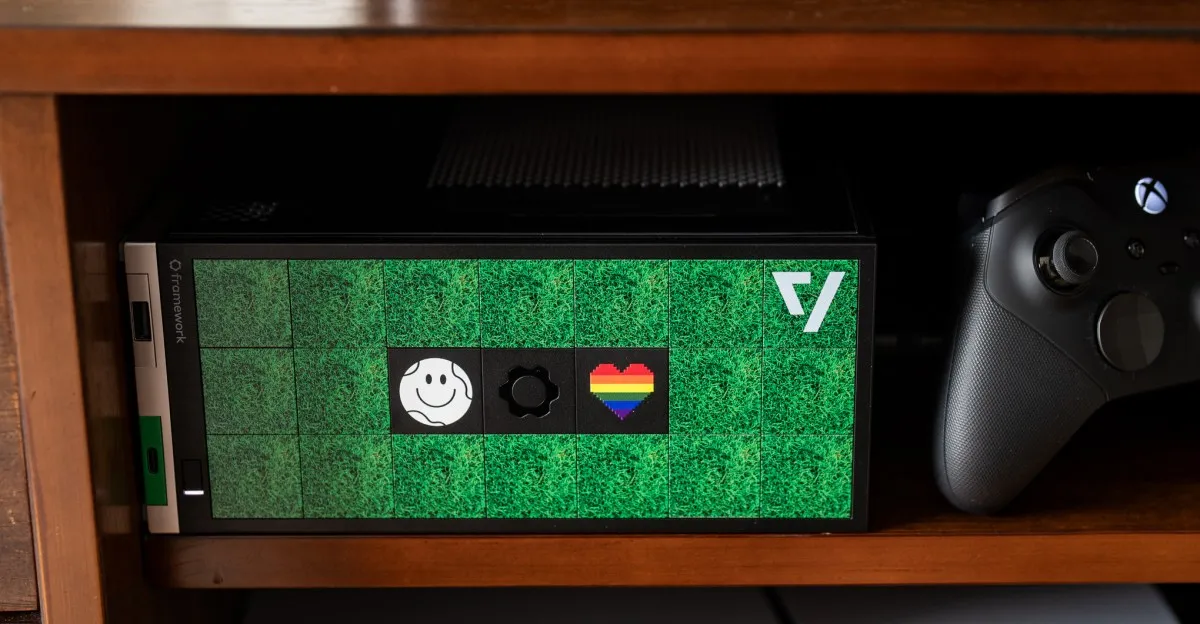
For many gamers, the dream of having a single, powerful PC gaming platform is a reality made possible by the Framework Desktop. This small yet mighty device is designed for those who want a seamless gaming experience, allowing you to enjoy your expansive Steam library without the hassles commonly associated with traditional gaming setups. Although the Steam Deck is a fantastic handheld option, the Framework Desktop offers a more powerful alternative that excels both on your TV and at your desk.
Gaming laptops often come with their own set of challenges: they're typically noisy, bulky, and can be cumbersome to navigate without a keyboard and mouse. Desktops, while powerful, are frequently too large for convenient living room use. My previous hopes for Valve’s Steam Machine initiative fell short, leaving me longing for the simplicity of a PlayStation 5. However, after spending weeks with the Framework Desktop running a clever Linux distribution called Bazzite, my optimism for a streamlined PC gaming future has been reignited.
Getting started with the Framework Desktop was surprisingly straightforward. In under an hour, I was able to install Bazzite, which is an open-source alternative to SteamOS. This setup mimics the game mode and Proton compatibility layer of the Steam Deck, allowing you not only to play games but also to access a desktop environment for productivity. This means I can game at 4K / 60fps on a device smaller than a PS5 that remains quiet and can be woken up with a gamepad from the comfort of my couch.
Bazzite empowers the Framework Desktop to function as a Steam Machine experience, measuring just 4.5 liters in volume. It outperforms average home theater PCs and offers a level of power that is hard to find in similar devices. While the Framework Desktop starts at $1,099, or $1,999 for the AI Max+ 395 version I tested—with 16 CPU cores and 128GB of RAM—it transcends the traditional gaming console experience.
If you’ve been considering alternatives to Windows, Bazzite is an excellent option. It simplifies the transition away from Microsoft, especially for those looking for an escape from Windows 10, or those frustrated with Windows 11’s focus on monetization. With a user-friendly installer and strong native support for essential applications like Chrome, Slack, and Discord, Bazzite offers a functional yet enjoyable environment for everyday computing.
For those who still need Windows for specific apps or games, dual booting is an option. I opted to install Bazzite on a separate internal NVMe drive to maintain a clear distinction between my work and gaming environments. This setup allows me to boot into Windows when necessary, especially for applications like Lightroom Classic or multiplayer games that require stricter anti-cheat measures.
In terms of performance, my experience with the Framework Desktop has been impressive across various titles. Here’s a quick overview of how it handled some popular games:
Cyberpunk 2077: Achieved 4K at around 60fps on medium settings without ray tracing.Helldivers 2: Maintained solid 4K performance with medium settings, though it dipped in busy areas.Street Fighter 6: Performed well at 4K while maintaining 60fps with most settings on medium.Monster Hunter Wilds: Required adjustments to maintain decent visuals and smooth gameplay, but performed adequately.Elden Ring Nightreign: Achieved 4K at approximately 50fps on medium settings.While not every game runs flawlessly on Linux, the Framework Desktop and Bazzite combo demonstrate the potential for a viable PC gaming future that rivals traditional consoles. The time is ripe for a resurgence of Steam Machines, and Bazzite is paving the way for an exciting new chapter in gaming.
In conclusion, the Framework Desktop combined with Bazzite offers a powerful and flexible solution for gamers looking to break away from conventional setups. While there are still challenges to overcome, such as compatibility issues with specific titles, the overall experience is promising. As the gaming landscape evolves, devices like the Framework Desktop are leading the way toward a more integrated and user-friendly PC gaming experience.